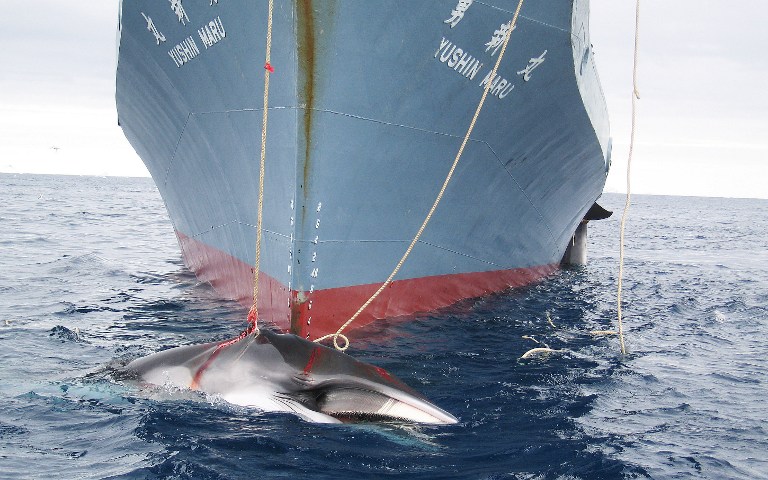SUMMARY
This is AI generated summarization, which may have errors. For context, always refer to the full article.

THE HAGUE, Netherlands (UPDATE) – Australia took its battle to stop Japanese whaling in the Antarctic to the UN’s highest court on Wednesday, june 26, in an emotionally charged case activists say is make-or-break for the giant marine mammals’ future.
Canberra is arguing before the International Court of Justice (ICJ) in The Hague that Japan is exploiting a loophole by continuing to hunt whales as scientific research in spite of a 1986 International Whaling Commission ban on commercial whaling.
“Japan seeks to cloak its commercial whaling under the labcoat of science,” one of Australia’s lawyers in the case, Bill Campbell, told the court as hearings began.
“It simply isn’t science,” Campbell said, stressing Australia’s otherwise “excellent” relationship with Japan.
Canberra took Tokyo to court in 2010, saying that more than 10,000 whales have been killed since 1988 as a result of Japan’s JARPA and JARPA II research programs, allegedly putting the Asian nation in breach of international conventions and its obligation to preserve marine mammals and their environment.
While Norway and Iceland have whaling programs in spite of the 1986 moratorium on commercial whaling agreed through the International Whaling Commission (IWC), Japan exploits a loophole that allows lethal scientific research, Canberra said.
In its application, Australia accuses Japan of breaching its obligation to “observe in good faith the zero catch limit in relation to the killing of whales.”
Deputy Foreign Minister Koji Tsuruoka said at the court that “Australia’s claim is invalid. Japan’s research whaling has been conducted for scientific research in accordance with international law.”
Japan is “proud of its tradition of living in harmony with nature, and utilizing living resources while respecting their sustainability,” he said.
The annual whale hunts have long drawn criticism worldwide, but Tokyo said it would robustly defend the practice that also puts whale meat on dinner plates back home.
Tokyo says the research is conducted to “better understand the sustainability of whale stocks” and it does not exclude a push for commercial whale hunting to be authorized in the future.
“We are however very much paying attention to the conservation of whales,” Japanese delegation spokesman Noriyuki Shikata told AFP on Tuesday, adding that the research was providing “very important data to understand whale stocks in the Antarctic.”
Shikata said Japan was “confident that it has a good case” in its first-ever appearance before ICJ judges.
The International Fund for Animal Welfare (IFAW), which has long campaigned for an end to whaling, said the case would have implications for “future compliance with all multilateral environmental agreements.”
“Commercial whaling, whether conducted openly or under the guise of science is a cruel and outdated practice which produces no science of value,” Patrick Ramage, who heads the IFAW’s Global Whale Programme, said in a statement.
“Japanese taxpayers are being forced to subsidize an industry that is dying in the water and the marketplace in the 21st century.”
Militant anti-whaling group Sea Shepherd, which will have observers at the ICJ, said it was a make-or-break case for the sea mammals.
“If nothing happens now, nothing else is going to happen,” Geert Vons, the group’s director in the Netherlands told AFP.
“It’s good that public opinion in Australia is so strong that politicians have decided to do something,” Vons said.
“Antarctica is the last really wild continent, it must be protected”.
A ruling in the hearing, in which New Zealand will also make a submission, is not expected for several months.
Established in 1945, the ICJ is the UN’s highest judicial body and settles disputes between nation states. It is the only one of five principal UN bodies not located in New York. – Rappler.com
Add a comment
How does this make you feel?
There are no comments yet. Add your comment to start the conversation.